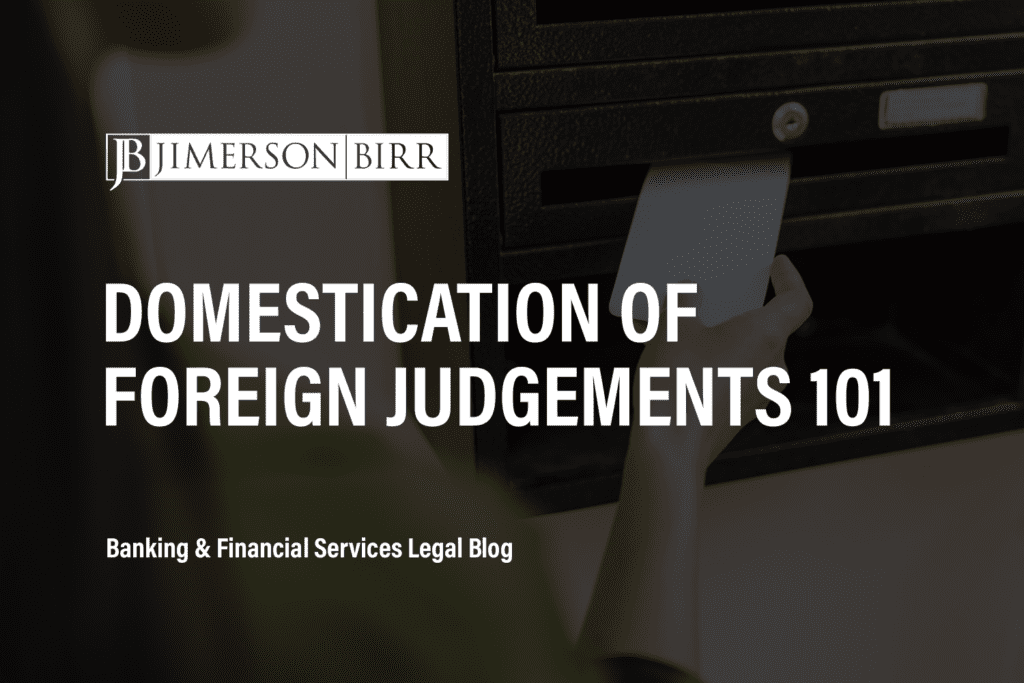Judgment creditors are often faced with the question of how to collect an out-of-state judgment (also commonly referred to as a foreign judgment) in Florida. Generally, when a creditor obtains a judgment in another state, and the judgment debtor is located in the State of Florida, or assets the judgment creditor wants to obtain are located in Florida, the judgment creditor must “domesticate” the judgment in Florida. Once the foreign judgment is domesticated, the judgment creditor may pursue post-judgment collections efforts in Florida.
This article explores how to properly domesticate a foreign judgment in the State of Florida in order to commence post-judgment collections efforts in Florida.
The Florida Enforcement of Foreign Judgments Act
The Domestication Process
Sections 55.501-55.509 of the Florida Statutes are referred to as the Florida Enforcement of Foreign Judgments Act. §55.501, Fla. Stat. Such Act governs the enforcement of foreign judgments in the State of Florida.
The steps necessary for domesticating a foreign judgment in Florida can be broken down into the following:
- Obtain a certified copy of the foreign judgment.
- File the following in the county where the judgment debtor or the subject property is located:
a. An affidavit to domesticate the foreign judgment. §55.505, Fla. Stat.
b. A certified copy of the foreign judgment, which must also be recorded in the county. Id.
c. Notice of registration of foreign judgment. Id.
Once the above documents have been filed and/or recorded, the Clerk must mail notice to the judgment debtor. §55.505(2), Fla. Stat. The judgment creditor should also mail notice to the judgment debtor as set forth in Section 55.505(2), Florida Statutes.
Once the notice of registration of foreign judgment has been sent to the judgment debtor, the judgment debtor then has 30 days to request a hearing to contest the validity of the foreign judgment. §55.509, Fla. Stat. If the debtor fails to contest the validity of the foreign judgment, then the Clerk will issue a foreign judgment certificate confirming that the judgment debtor has not objected to the domestication. A foreign judgment does not operate as a valid judgment/lien until 30 days after the mailing of notice by the clerk. §55.507, Fla. Stat. Once a foreign judgment has been properly domesticated in Florida, it will have the same effect as a judgment that is issued by a Florida Court.
Contesting Enforcement of the Foreign Judgment
Within thirty days after the date the foreign judgment is recorded, the judgment debtor is permitted to file an action contesting the jurisdiction of the court which entered the foreign judgment or contesting the validity of the foreign judgment. §55.509. The judgment debtor must also record a Lis Pendens directed toward the foreign judgment. §55.509, Fla. Stat. If the judgment debtor files such action contesting the judgment or jurisdiction of the court, the court may stay enforcement of the foreign judgment and the judgment lien. Enforcement of the foreign judgment should be stayed if sufficient grounds are shown. However, the court may require an appropriate security (e.g., a bond) to be posted. § 55.509(2), Fla. Stat.
Examples of grounds for contesting the enforcement of a foreign judgment include:
- The court does not have jurisdiction over the debtor
- The foreign judgment is not a “final judgment”
- The foreign judgment is on appeal
- Evidence of fraud or collusion
Simply put, the judgment debtor has the ability to stall (or sometimes completely stop) the enforcement of a foreign judgment in Florida. However, such burden would be on the judgment debtor.
Enforcement of a Domesticated Judgment
Once a foreign judgment has been properly domesticated in Florida, it will have the same effect as a judgment that is issued by a Florida Court. Thereafter, the judgment creditor may pursue collections efforts to collect the judgment. The collections efforts that a judgment creditor has available are exhaustive and are too voluminous to explain in this article. Nevertheless, a judgment creditor should consider the following:
- Post-judgment discovery (to locate assets and people)
- Depositions in aid of execution
- Writs of garnishment (against banks/financial institutions)
- Continuing writs of garnishment against salary and wages
- Attaching/executing on personal and real property
- Pursuing proceedings supplementary
- Pursuing fraudulent transfers
- Impleading third parties
Conclusion
The process for domesticating a foreign judgment in the State of Florida is primarily statutory based. As such, a judgment creditor needs to strictly comply with the Florida Enforcement of Foreign Judgments Act. It is prudent for judgment creditors to hire an experienced collections attorney.

